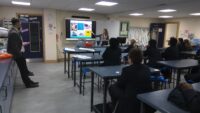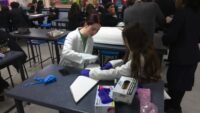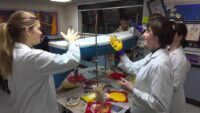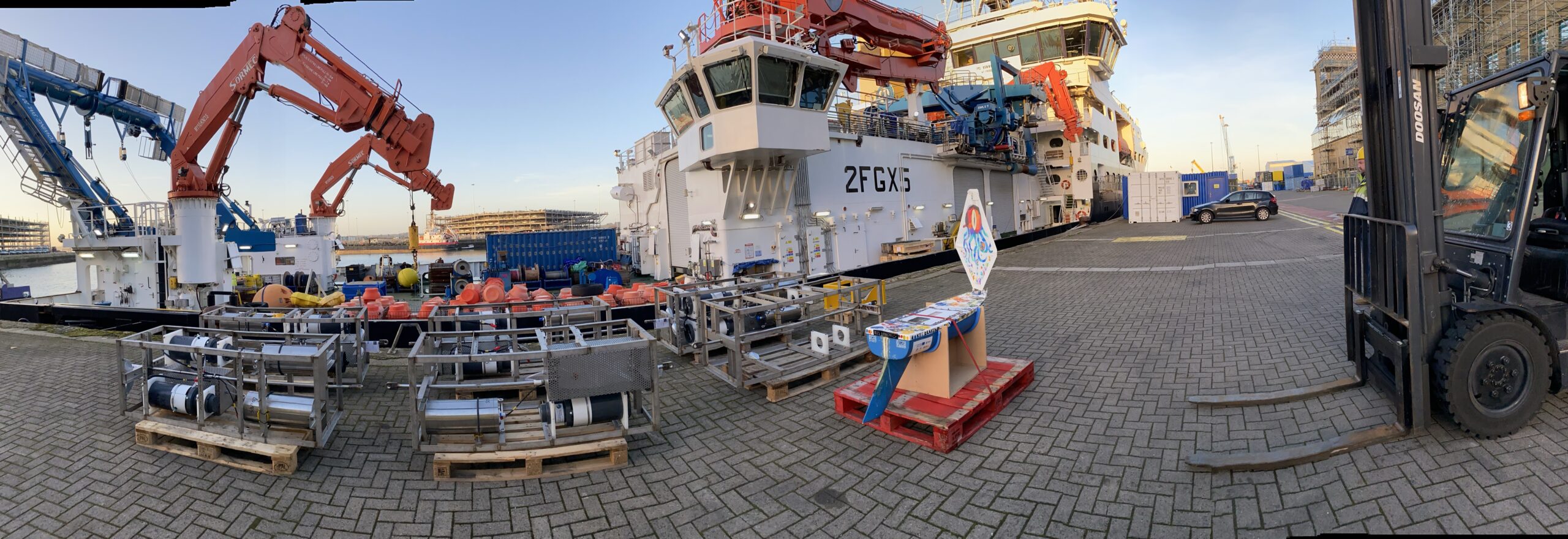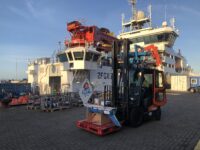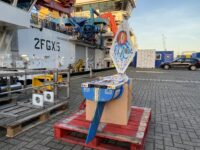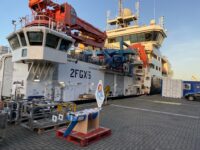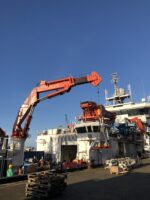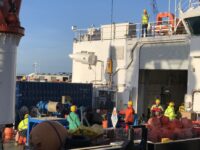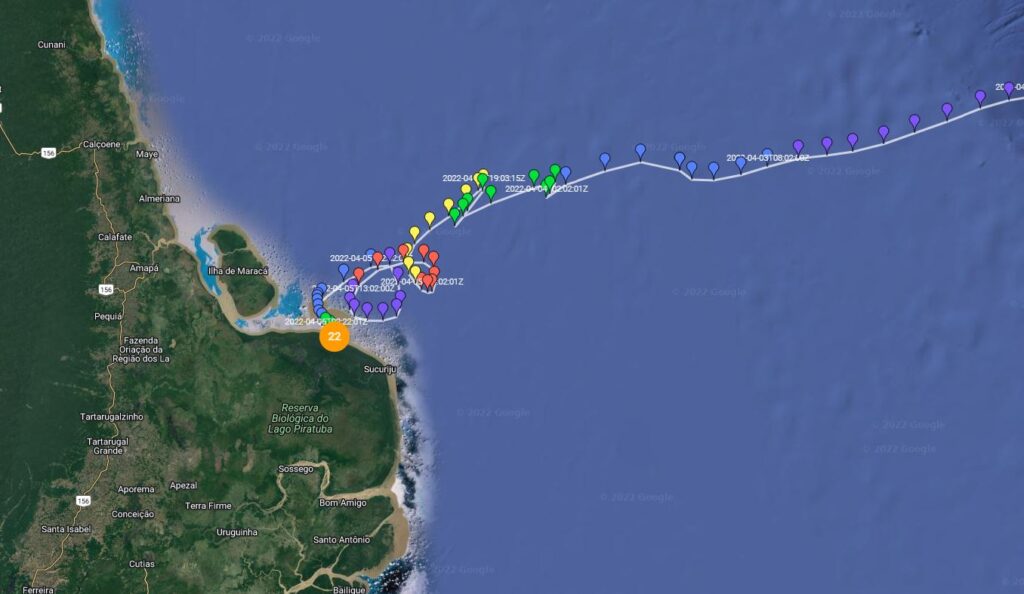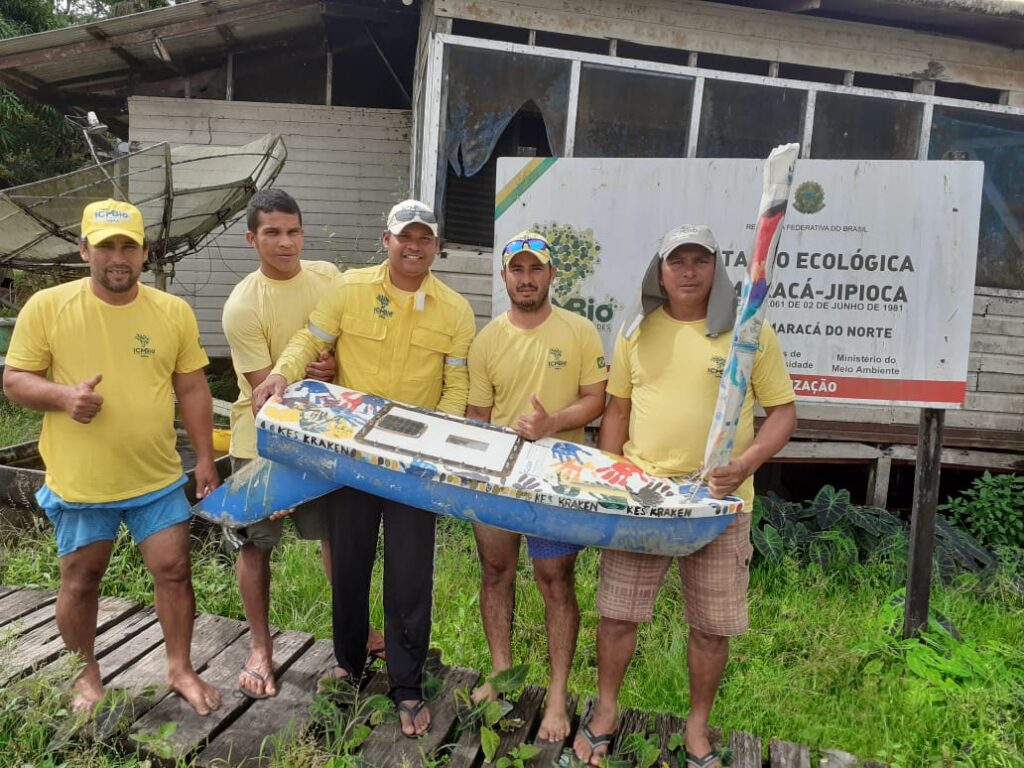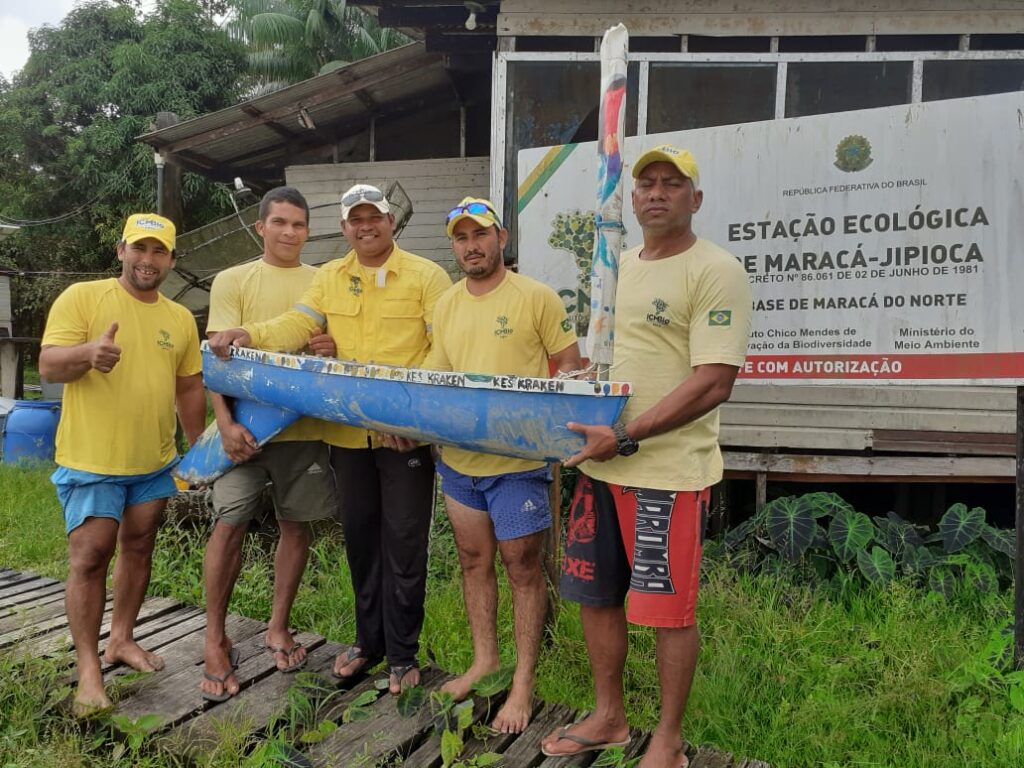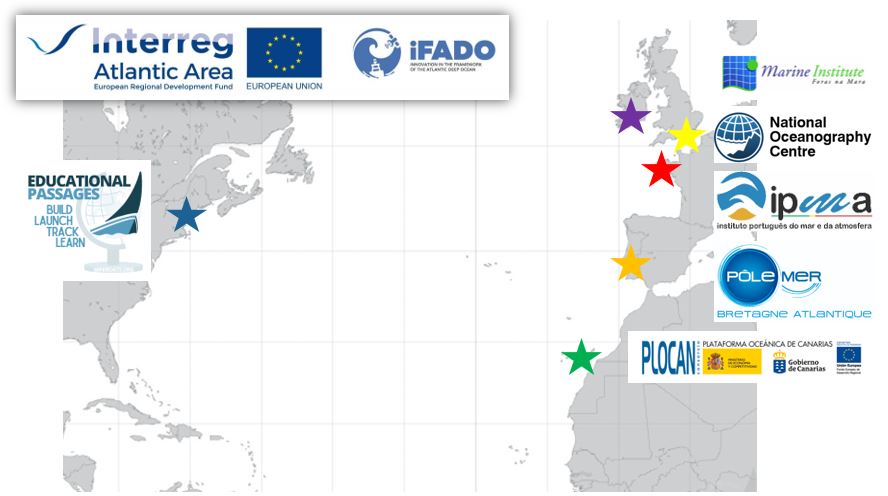Updates:
1st Voyage
-
September 24, 2021: NOC News announced "Mini-boat ‘KES Kraken’ built by Southampton students to set sail during NOC expedition"
The ‘KES Kraken,’ which was named by the students at King Edwards VI School. The boat will be built over a number of weeks as part of a hands-on afterschool project. Students will equip it with a sail and a satellite tracker, that will allow them and the public to track the boat’s ocean journey. The mini-boat will also be one of the first to include a new sensor system which will also allow the boat to collect additional data about the ocean once deployed, which will allow the students to gain a better understanding of ocean currents, weather and technology. If the boat lands, the students will also have the opportunity to connect with a local school and community in the boat’s destination, allowing them to learn more about cultures around the world.
During the programme, students will also get the chance to hear Ocean Literacy talks from Educational Passages, and NOC experts Dr B.B. Cael, Dr Ben Moat, Prof. Stephanie Henson, Dr Eleanor Frakja-Williams, Dr Alice Horton and Prof. Meric Srokosz, to help further enrich their understanding of topical ocean and environmental issues including microplastics and climate change.
The project is part of the wider iFADO (Innovation in the Framework of the Atlantic Deep Ocean) project team, which will see the launch of five mini-boats this year around the Atlantic from Ireland, Portugal, Spain, France, and the United Kingdom.
Read the full article from the NOC website at https://noc.ac.uk/news/mini-boat-kes-kraken-built-southampton-students-set-sail-during-noc-expedition
-
November 2021 - Students complete preparations of their miniboat
Since early September, a selection of Second Year students worked together with Sixth Form helpers to prepare, deploy, and track their very own miniboat in the Atlantic. Thanks to weekly visits from scientists, the students also had the chance to learn about different aspects of marine science: ocean currents, microplastics, marine autonomous robotic systems, climate change etc.
KES KRAKEN will make its maiden voyage onboard RRS Discovery heading to the Southern Ocean. In keeping with maritime tradition, it will be gifted to Poseidon while crossing the Equator. Our miniboat is equipped with a GPS tracker and air and water temperature sensors, allowing us to track its whereabouts and the conditions it encounters.
Read the latest blog post from the King Edward VI School: Students build ‘KES Kraken’ to set sail during The National Oceanography Centre expedition.
-
December 2021 - Ready for Deployment
Due to strict Covid-related safety measures, the crew from the cruise were not able to meet the students in person, but while onboard the RSS Discovery were embraced the new normal by meeting with them via Zoom:
https://twitter.com/ukgovbluebelt/status/1463825205055340551
November 25, 2021 – The miniboat is now aboard the ship and ready to be part of the #DYK143 cruise!
December 6, 2021 – Unfortunately, the DYK143 cruise was cancelled:
A @ukgovbluebelt statement on the #DY143 expedition: pic.twitter.com/PXrQ6ksRxs
— Blue Belt Programme (@ukgovbluebelt) December 6, 2021
-
February 19, 2022 - Launched with DY146
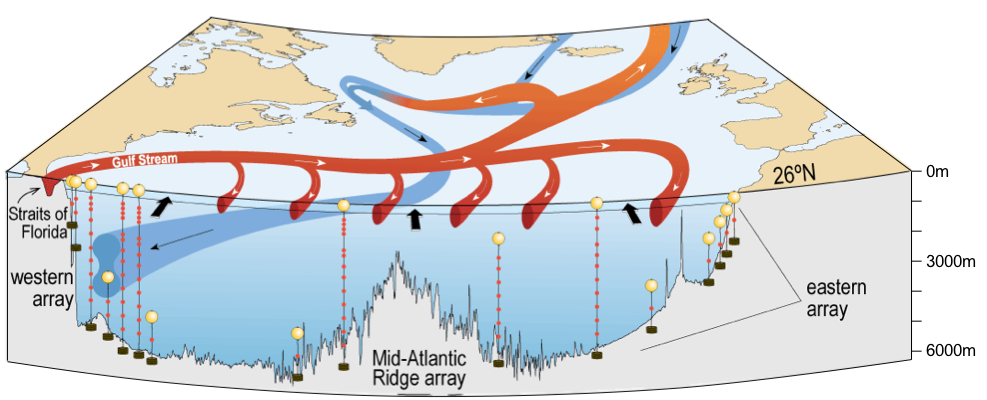
Thanks to the incredible team at NOC, a new cruise was quickly identified for launching the miniboat, DY146 (sails 9th Feb, returning 8th March). Destination is along 26.5 deg N in the tropics as part of the RAPID project.
The RAPID project (see diagram to the right, EB Moorings from https://nerc.marinefacilitiesplanning.com/programme/timeline) is an observing system for the meridional overturning circulation (MOC) at 26.5°N in the Atlantic.
It will be interesting to compare the data from the moorings and see how the miniboat travels!
We’d like to especially thank Dr. Dafydd Gwyn Evans, Dr. Ben Moat, and Dr. Nick Rundle for their accomodations to bring KES KRAKEN aboard and launch it for the students at KES (and also Dr. Sue Hartman and Dr. B.B. Cael for coordination and leading this iFADO project!).
February 7, 2022 – Dockside and ready again for deployment
Thanks to the NOC team for capturing pictures during the loading of the miniboat onto the research ship.
February 14, 2022 – PRESS RELEASE: Boat Built by Southampton Students Departs on RRS Discovery
See full article at https://noc.ac.uk/news/mini-boat-built-southampton-students-departs-rrs-discovery and reports from Marine Technology News and ECO Magazine.
A mini boat built by students from King Edward VI School in Southampton has made its maiden voyage from the city on the world-class research ship, RRS Discovery as part of a project coordinated by the National Oceanography Centre (NOC).
The Educational Passages project has seen students work together over three months after school to build the boat, equipping it with a sail and satellite tracker that will allow them and the public to follow the boat’s ocean journey.
Named ‘KES Kraken’ by the students, the five-foot mini boat will be deployed by NOC scientists in the Atlantic Ocean during their expedition to service a collection of moorings that are helping to measure ocean currents and examine the effects on short-term weather and long-term climate. The mini boat will be one of the first to include a new sensor system which will collect data on ocean currents, weather and technology to provide students with a better understanding on the role of the ocean in climate change. If the boat lands, the students will also have the opportunity to connect with a local school and community in the boat’s destination, enabling them to learn more about cultures around the world.
During the project, NOC scientists also visited the school to provide talks on topical ocean and environmental issues including microplastics and climate change.
Dr B.B. Cael, part of the Ocean BioGeosciences group at the NOC, said: “We really enjoyed working with this group of young students to engage them in oceanography in such a unique way. It’s so important to inspire people from a young age, especially on crucial environmental issues like climate change and microplastics that they might not otherwise be exposed to in school. We’re looking forward to tracking the mini boat once it’s deployed from the RRS Discovery and seeing where in the world in turns up.”
Dr Mayor, Teacher of Physics and Junior Science Coordinator at King Edwards VI School, commented: “I hope all students involved in the project were inspired by the NOC experts who visited the school, and have dedicated their careers to science. It was also wonderful to see Sixth Form assisting younger students with the project.”
The King Edward VI School project is also a collaboration between US-based Educational Passages non-profit and the wider iFADO (Innovation in the Framework of the Atlantic Deep Ocean) project team, which will see the launch of five mini-boats around the Atlantic from Ireland, Portugal, Spain, France and the United Kingdom. The production of the boat was funded primarily by part of the EU Interreg iFADO project, with additional support from the EU-funded GOCART project and the NERC-funded DIAPOD projects.
The KES Kracken can be tracked and joins the Educational Passages fleet of miniboats at sea.
February 19, 2022 – LAUNCHED!
The crew sent us a note that the boat was launched on 2022-02-19 16:11:07 GMT at 23.762784 N, -24.153244 W. They took video and will send later so check back later to watch yourself!
Fair winds and following seas, KES KRAKEN!
Here’s a summary from Dr. Gwyn Evans, Chief Scientist of the work they completed during the expedition:
-
Sensor Data
This miniboat has a sensor pack installed, so in addition to location it will report air temperature, water temperature, and pitch. Zoom in to the map below to see the data reporting from the sensor package. Note that the track of the RSS Discovery is also shown from when the miniboat was on deck.
-
April 6, 2022 - Landed in Brazil and recovered
March 29, 2022 – Approaching South America
Educational Passages’ Executive Director Cassie Stymiest reached out to the iFADO project team on March 29 with the following note:
“KES KRAKEN has had an interesting journey so far in its 37 days at sea, and is currently heading for South America. Where and when do YOU think it will land? The goal, we hope, would be to find someone who can recover the boat quickly upon landing to avoid any damage and then bring it to a nearby school so students can connect!”
April 6, 2022
KES KRAKEN landed on the shores of Brazil on April 6, 2022 at 3:42 GMT after only 46 days at sea. A recovery mission was already in progress thanks to Francisco Campuzano of the iFADO project team.
Over in Morocco, another iFADO project miniboat, the TUGA de Costa Azul, is also approaching shore where Paulo and Luis have contacts ready and waiting to assist in its recovery.
April 7, 2022
We got the official word over email from Francisco who said, “I’m happy to inform you that the Kraken was recovered with the local coordination and support of Prof. Dr. Gabriel Araujo da Silva (in copy) from Universidade do Estado do Amapá. I’m sharing here some pictures of the recovery by the people of the Estação Ecológica de Maracá-Jipioca. It’ll be great to work in collaboration with him and the UEAP in the future adventures of the Kraken.”
Here are some pictures of the crew:
We’d like to thank Iranildo Coutinho (head of the CU), Cristiane Gois (substitute chief of the CU), Girlan Dias (brigade leader), and brigade members Jorgeney Figueiredo, Edvanilson Reis, Helton Santana, Mizael da Silva, Juberlan Souza and Leandro dos Santos.
The crew also captured the rescue on video:
They also shared a video of a special visitor that they spotted during the rescue mission:
April 13, 2022 – PRESS RELEASE
Mini boat built by Southampton students recovered in Brazil after 46 days at sea
https://noc.ac.uk/news/mini-boat-built-southampton-students-recovered-brazil-after-46-days-sea
April 25, 2022 – Story highlighted by Amapá News
Sonda inglesa que analisa clima no Oceano Atlântico viaja 4 mil km e é resgatada na costa do Amapá (English probe that analyzes climate in the Atlantic Ocean travels 4 thousand km and is rescued off the coast of Amapá)
This is one of five miniboats to be built and launched in collaboration with the iFADO Project (Innovation in the Framework of the Atlantic Deep Ocean).
King Edward VI School would like to express their gratitude to:
- Ms Cassie Stymiest from Educational Passages;
- Dr B.B Cael,
- Dr B. Moat,
- Dr A Horton,
- Dr E. Frajka-Williams,
- Dr D. J. Mayor,
- Dr F. Carvalho,
- Prof. M Srokosz from NOC;
- Dr P. Whomersley from CEFAS and members of the cruise DY143 for generously donating their resources and time.
This project was also financially supported by:
- Educational Passages,
- EU Interreg iFADO project (PI Dr S. Hartman)
- With additional support from the EU-funded GOCART (PI Dr S. Henson) project and the NERC-funded DIAPOD (PI Dr. D.J.Mayor) projects


